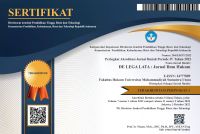Sistem Peradilan Edukatif Dalam Sistem Peradilan Anak Di Indonesia
Abstract
Keywords
Full Text:
PDFReferences
Ali, Zainudin. (2011). Metode Penelitian Hukum. Jakarta: Sinar Grafika.
Haekal, Muhammad Husein. (1984). Sejarah Hidup Muhammad. Jakarta: Tintamas.
Hamdani, Ikhwan. (2003). Sistem Pasar, Pengawasan Ekonomi (Hisbah) dalam Persepektif Ekonomi Islam. Jakarta: Nur Insani.
Junaidi, Wawan. (2006). Rekonsepsi Al-Istihalah dan Implikasinya Terhadap Hala-Haram Bahan Pangan Dengan Pendekatan Ilmu Kimia. Jakarta: Badan Litbang dan Diklat Departemen Agama RI.
Jusmaliani. (2008). Bisnis Berbasis Syariah. Jakarta: Bumi Aksara.
Konoras, Abdurrahman. (2017). Jaminan Produk Halal Di Indonesia Perspektif Hukum Perlindungan Konsumen. Jakarta: Rajagrafindo Persada.
Majelis Ulama Indonesia. (2012). Fatwa Majelis Ulama Indonesia (MUI) dalam Persepektif Hukum dan Perundang-Undangan. Jakarta: Badan Litbang dan Diklat Kementrian Agama Republik Indonesia.
Muhammad, Abdulkadir. (2004). Hukum dan Penelitian Hukum. PT. Citra Aditya.
Rahman, Afzalul. (2000). Muhammad Sebagai Seorang Pedagang. Jakarta: Swarna Bhumi.
Shabiri, Abul Futuh. (2017). Sukses Bisnis Berkat Wasiat Nabi. Jakarta: Pustaka Al-Kausar.
Sidik, H. Salim., & Nurbani, Erlies Septiana. (2017). Penerapam Teori Hukum Pada Penelitian Tesis dan Disertasi. Jakarta: Rajagrafindo Persada.
Undang-Undang Nomor 7 Tahun 1996.
Undang-Undang Nomor 18 Tahun 2012 tentang Pangan.
Undang-Undang Nomor 33 Tahun 2014 tentang Jaminan Produk Halal.
Undang-Undang Nomor 8 Tahun 1999 tentang Perlindungan Konsumen.
Uways, Abdul Halim. (1998). Fikih Statis-Dinamis (terjemahan Zarkasyi Chumaidy, dari Al-Fiqh al-Islamiy Bayn at-Taqawwur wa as-Sabat). Bandung: Pustaka Hidayah.
Zulham. (2013). Hukum Perlindungan Konsumen. Jakarta: Pranadamedia Group.
DOI: https://doi.org/10.30596/dll.v3i2.3152
Refbacks
- There are currently no refbacks.
Address:
Faculty of Law, University of Muhammadiyah Sumatera Utara Jl. Kapten Mukhtar Basri No. 3 Medan, Kode Pos 20238
E-mail: delegalata@umsu.ac.id
Telp/HP/WA : 081262664567
DE LEGA LATA: Jurnal Ilmu Hukum is abstracting & indexing in the following databases:
De Lega Lata: Jurnal Ilmu Hukum is licensed under a Creative Commons Attribution-ShareAlike 4.0 International License.
Statcounter









